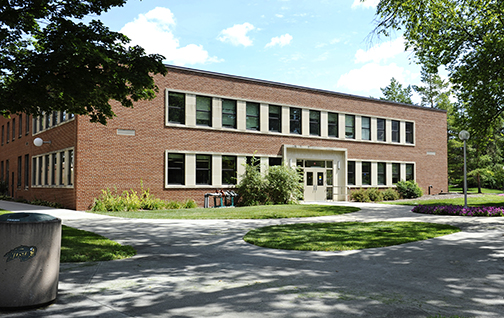The agricultural systems management (ASM) program combines an understanding of the agricultural, biological and physical sciences with economics, managerial and technical skills. This understanding of science, systems management and applications of engineering can be applied to a career in the production and processing of food, feed, fiber and fuel, and the marketing, sales and distribution of agricultural products and services.
The Program
The ASM major in the College of Agriculture, Food Systems, and Natural Resources is administered by the Department of Agricultural and Biosystems Engineering. The ASM program leads to a Bachelor of Science degree and includes core requirements in mathematics, communications, sciences, humanities and social sciences. In the major, students complete technical systems courses in machine principles, power systems, computer applications, materials handling, site specific agriculture, environmental resources management, electrical systems and electronics, and information/decision support technology. The curriculum balances hands-on knowledge of technology with instruction in agricultural sciences and agribusiness principles. A degree is awarded after completion of a minimum of 126 credits.
The ASM curriculum has the flexibility to permit individuals from both rural and urban backgrounds to develop a program to meet personal career objectives. Minors may be developed in related fields of production agriculture, agribusiness or in fields that add curriculum diversity, e.g., international studies, communication, natural resources management, business administration, accounting, or industrial management.
ASM students are encouraged to consider practical work experience during their college program. Cooperative Education provides opportunities for students to gain valuable career related experience.
Career Opportunities
The opportunities for ASM graduates are many and diverse. Graduates may, for example:
1. Be employed by companies and agencies providing inputs and technical services for agricultural production:
- Business Manager, Titan Machinery
- Loan Officer, National Bank of Harvey
- Territory After Market Manager, Deere and Company
- Irrigation Sales and Service, Reinke Manufacturing Co.
- Parts Manager, RDO Equipment
- Precision Ag Specialist, Precision Partners
- District Sales Manager, Interstate Seed Co.
2. Work with agribusiness companies and agencies that handle, store, process and distribute agricultural products and foods:
- Station Manager, Pioneer Hi-Bred International
- Petroleum Sales Specialist, Cenex/Land O'Lakes
- Elevator Manager, ADM
- Production Management, Black Gold Farms
- Crop Consultant, Triangle Agronomy
3. Work with companies and agencies providing inputs and technical services to rural and urban communities and the general society:
- CEO, Cass County Electric
- Ag Science Teacher, North Central Schools
- Soil Conservationist, USDA or
- Natural Resources Conservation Service
- Farm Appraiser, Farm Credit Services
- Energy Use Advisor, Verendrye Electric Cooperative
- Water Quality Specialist, USDA or Extension Service
4. Be self-employed, performing services as consultants, or as owners or operators of businesses:
- Owner, Credit Management Consulting
- Owner, Lynnes Bison Farms
- Owner, Hoffman Irrigation
- Owner, Rust Sales
Scholarships
Several scholarships are available through the department. These scholarships range from $300 to $4,000. Students also may be eligible for scholarships from the College of Agriculture, Food Systems, and Natural Resources.
Extra-Curricular Opportunities
The ASM Club offers students opportunities to participate in professional and social activities with other students at the local, regional and national levels. ASM Club members take an active part in the annual Agricultural Technology Expo, go on field trips and are involved in public service activities. Being an active participant in student organizations helps students develop leadership, teamwork, organization and communication skills. These skills are highly sought by those industries that hire ASM graduates.
A Well-Equipped Teaching Facility
The ASM degree program is housed in the Agricultural and Biosystems Engineering building which includes offices, classrooms and laboratories. Laboratories are furnished with equipment typical of that used in industry and research, such as personal computers that are networked to the University’s computer facilities, tractors, engines, surveying equipment, etc. Department faculty have received recognition for outstanding teaching and research on the state and national levels. Faculty expertise varies across a wide and diverse range of specialties related to agricultural and biological systems.
Plan of Study
IMPORTANT DISCLAIMER: This guide is not an official curriculum. This guide is a sample four-year degree plan of how students might plan this major with other degree requirements to complete their education in four years.Student plans will vary from this sample due to a variety of factors, such as, but not limited to, start year, education goals, transfer credit, and course availability. To ensure proper degree completion, enrolled students should utilize Degree Map and Schedule Planner in Campus Connection and consult regularly with academic advisors to ensure graduation requirements are being met.

